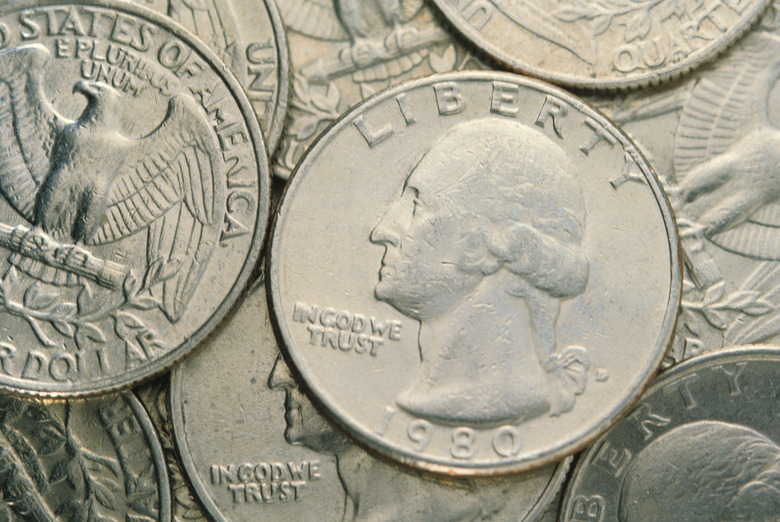How To Calibrate A Small Scale With Quarters
A common practice when purchasing some kind of measurement device, such as a scale or ruler, is to calibrate it. Calibration is important for determining the accuracy of that measurement device.
For example, if your friend gives you an old wooden 12-inch ruler, you may want to calibrate the ruler to determine if it is truly 12 inches, since wood can contract and expand due to temperature.
You could use a new, plastic 12-inch ruler, which has not been bent or changed since manufacturing to determine if the wooden ruler is in fact 12 inches or not. You do have to assume that the manufacturers have also calibrated the machines that make the plastic rulers, because of course, you have to accept that the plastic ruler is, in fact, 12 inches.
But what about for calibrating scales in order to properly measure masses? Let's go through a quick scale calibration procedure for a digital scale.
TL;DR (Too Long; Didn't Read)
Calibration is the procedure of comparing the measurement of some quantity as measured by a device against a known standard.
D.I.Y. Scale Calibration Procedure
D.I.Y. Scale Calibration Procedure
First, because we are on the Earth, the weight of an object is the mass times the acceleration due to gravity. Sometimes "mass" and "weight" are used interchangeably because the weight of an object is simply the mass scaled by the acceleration due to gravity. It is important, however, to remember that mass is the amount of matter in an object, whereas weight is the force of gravity on that object.
To begin calibration, you need to find something to use as a standard mass.
New quarters from the United States Mint are an option; a brand new U.S. quarter has a mass of 5.670 grams. Other options are brand new U.S. pennies or nickels; a penny has a mass of exactly 2.500 grams, and a nickel has a mass of 5.000 grams.
Place your chosen coin on the scale and read the output. If you placed a penny on the scale, you should read 2.500 grams. If you place a quarter on the scale, the output should read 5.670 grams.
If the scale read 5.671 grams, clearly there is a 0.001 gram difference in the reading and the known mass. Thus, you have also determined that any calibration error will likely be around 10-3 grams, meaning that the scale is fairly accurate for tenths and hundredths.
If the reading for the penny was 2.500, but the reading for the quarter was was 5.700 grams, you can see that the scale only has the resolution to measure a tenth of a gram. This is yet another form of calibration.
Objects That Weigh 10 Grams
Objects That Weigh 10 Grams
It may be helpful to have a range of objects of known mass to determine if there is any change in the calibration for the scale for extreme mass values. Thus, find a few different objects, such as objects that weigh 10 grams (or have a mass of 10 grams) like the coins, as well as household items that weigh 100 grams.
Why not just stack up a ton of coins? If you have 20 nickels, or 40 pennies, you have 100 grams that you can use for calibration. Place the coins on the scale and observe the reading. The mass should read 100.000 grams exactly. If the reading is any more or less than 100.000 grams, you again can determine a calibration value.
Some scales are more accurate for larger masses, so it is possible that for small masses (such as a single coin) there is a noticeable difference between the measurement and the known mass, which disappears as you add coins.
Calibration is a general technique that can be used to determine how accurately any measuring device is able to measure the intended quantity.
Cite This Article
MLA
Gupta, Lipi. "How To Calibrate A Small Scale With Quarters" sciencing.com, https://www.sciencing.com/calibrate-small-scale-quarters-12097140/. 28 August 2019.
APA
Gupta, Lipi. (2019, August 28). How To Calibrate A Small Scale With Quarters. sciencing.com. Retrieved from https://www.sciencing.com/calibrate-small-scale-quarters-12097140/
Chicago
Gupta, Lipi. How To Calibrate A Small Scale With Quarters last modified March 24, 2022. https://www.sciencing.com/calibrate-small-scale-quarters-12097140/
